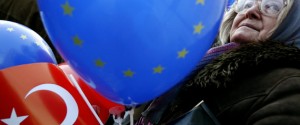 Just about a year ago, Burhan Kuzu, head of the Turkish National Assembly’s Constitution Committee and member of the AKP, the party in power, called the European Commission’s Progress Report for Turkey “garbage”, and actually threw a copy of it to the floor during an interview on national television! A year later, the most recent Progress Report has fortunately elicited a more positive reaction.
Just about a year ago, Burhan Kuzu, head of the Turkish National Assembly’s Constitution Committee and member of the AKP, the party in power, called the European Commission’s Progress Report for Turkey “garbage”, and actually threw a copy of it to the floor during an interview on national television! A year later, the most recent Progress Report has fortunately elicited a more positive reaction.
Several changes contributed to a more constructive climate. In February 2013, the French Foreign Minister Laurent Fabius announced that France was in favor of resuming accession talks with Turkey, the first gesture towards “repairing the damages” brought about to Franco-Turkish relations during the Sarkozy presidency (1). Following France’s footsteps, Angela Merkel declared that Germany was also favorable.
Talks should have resumed in June but the violent crackdown of Istanbul’s Taksim Square “Gezi” protests in May and June had a negative effect on members of the Union. It was not until October 22nd that representatives of the 28 member states have eventually decided – unanimously, as required by EU rules – to restart accession talks. Finally, after a three-year standstill, discussions resumed on November 5th with the opening of Chapter 22 on “Regional policy and coordination of structural instruments”, aiming at reducing socio-economic differences between regions.
What has changed on both sides?
Fundamentally, nothing has changed when it comes to the mutual interests of the EU and Turkey. Obstacles to Turkish accession have not changed either. What did change on the European side, though, was the European Commission’s wish to avoid further deterioration of relations with Turkey and to fend off the risk of a breakdown. Furthermore, it is possible, as columnist Murat Yetkin argues (2), that the apparent failure of the “Arab spring” made European leaders realize that better relations with Turkey, still the only country in the Moslem world to remain constitutionally secular, could actually help both the EU and the Middle East.
With respect to Turkey:
– the “Arab spring” did not go in the direction wished by the current government, the Syrian problem being a blatant example;
– efforts to initiate multilateral strategic alliances outside the EU and NATO (Şamgen area (3), Caucasia Stability and Cooperation Platform, and most recently Shanghai Cooperation Organization (4) ) have not brought about any tangible results (5).
Meanwhile, public opinion surveys indicated that Turkish people in favor of joining the EU amounted to 44% (down from 73% in 2004), while 38% thought that Turkey should act independently and not cooperate with any other country on international matters (according to the German Marshall Fund’s latest Transatlantic Trends Report (6) ).
Now the Turkish disinterest can be explained by the hostility of a good part of the European public opinion vis-à-vis the Turkish membership. Furthermore the Turkish PM Erdoğan’s rhetoric has only fueled the vicious cycle of tensions on both sides. In addition, the Euro crisis has undermined the image of the EU in the Turkish public opinion.
On the domestic front, however, one would expect the importance of the “Copenhagen criteria” to be more obvious than their international significance. Indeed, these criteria have had an “anchor” effect in inspiring democratic reforms, especially from 2002 to 2005. What’s more, the crackdown of the Gezi protests and the recent decision to prohibit coed dorms for college students constitute violations of the freedom of expression and of the right to a private life, precisely what the Copenhagen criteria are designed to protect.
It appears that the less the government feels bound by EU-inspired principles, the more fundamental rights of the people are likely to be violated.
(1) (in French) http://www.turquieeuropeenne.eu/5430-perceptions-turques-de-la-france.html
(2) http://www.radikal.com.tr/yazarlar/murat_yetkin/ab_ile_kopruleri_tamirde_fasil_firsati-1157031
(3) A joint visa policy among Turkey, Iran, Iraq and Syria, thought of as a ‘competitor’ to the Schengen area
(4) Eurasian political, economic and military organization founded in 2001 in Shanghai by the leaders of China, Kazakhstan, Kyrgyzstan, Russia, Tajikistan, and Uzbekistan
(5) (in Turkish) http://taraf.com.tr/cengiz-aktar/makale-stratejik-bosluk.htm
(6) http://trends.gmfus.org/files/2013/09/TTrends-2013-Key-Findings-Report.pdf





